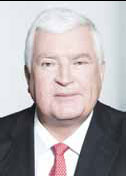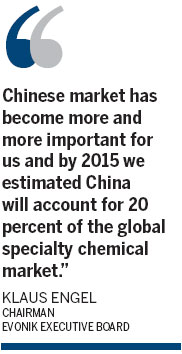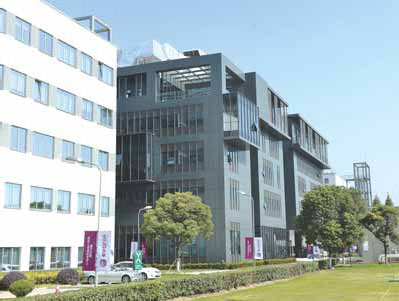Company Special: Chemical giant Evonik making big bet on China
Many chemical giants are suffering in the world's second-largest economy as demand ebbs in key energy-intensive industrial sectors such as steel, cement and automobiles.
But Evonik Industries AG, one of the world's largest companies focused on specialty chemicals, said it will step up efforts to invest in China's chemical market, which plays a key element in its global growth strategy.
"The Chinese market has become more and more important for us and by 2015 we estimated China will account for 20 percent of the global specialty chemical market," said Klaus Engel, chairman of the Executive Board of Evonik, despite headwind from the global recession and an economic downturn in the emerging markets for chemical companies.
In 2013, PetroChina, the listed arm of China National Petroleum Corp, reported operating losses from its refining and chemical businesses to 24.4billion yuan ($3.9 billion) in a financial filing to Shanghai stock exchange market.
The country's largest oil refiner China Petroleum and Chemical Corp, known as Sinopec, also reported financial losses in the first half of last year.
But the German company said growth prospects for the chemical industry will improve in the coming years and anticipated that sales in China will rise in 2014.
"Last year was a challenging year for many industries and companies due to the overall global economic situation as well as moderate growth in the emerging markets such as China, Brazil, Russia, and India," Engel said. "But we still believe China and other emerging markets will have stronger growth than the developed markets in Europe."
The various segments of China's chemical industry are having mixed fortunes. The CEO said based on the company's entire product portfolio, there will be huge business opportunities in the areas of healthcare, personal and home care, feed and specialty materials.
"We have seen high single-digit market growth in all these segments, so we will follow our strategy underlining these mega-trends in health, nutrition, resource efficiency and globalization," he said. "We keep asking ourselves what are the basic needs of the people in China?"
New leadership
There are several factors driving the growth of chemical industry. The senior executive believes that the government's sustainable goals for the economy and the plans for industrial restructuring will further boost demand for a variety of chemical products in the long term.
Last year marks the beginning of a once-in-a-decade power shift to a new generation of leaders, which has made its commitment to reform very clear, he said.
China's economy is shifting from being driven by investment and exports to domestic consumption-led growth with a focus on the service sector.

Engel said that the transition may trigger a slight slowdown in growth but will lead to long-term improvement to China's overall economic outlook.
"The chemical industry can contribute a lot for China to meet its sustainable growth targets," he said. "Our products such as amino acids can help make meat production more efficient and environmental friendly, while other specialty chemicals with high performance can be applied in the field of resource efficiency to reduce fuel and save energy. All this goes along with the government's sustainability strategy."
The government's focus on domestic consumption and food safety is another force pushing the China's chemical industry ahead in the near term, Engel said.
Food safety
"Retail sales of consumer goods are growing at a fast pace with demand driven by very basic needs due to China's booming middle class who ask for more high-quality products and food," he said.
Food safety has become a top concern in China as a string of safety scandals, particularly in 2008 when milk powder produced by a company in Hebei province was found illegally laced with melamine, which led to the deaths of six children and sickened 300,000 others.
To solve the issue of recurring scandals in the food industry in recent years, Engel suggested the government examine the value chain of the food industry, starting from the feed to the animals.
"The safe industrialization for the food and feed sector is very important to make food in China," he said. "As a global producer of amino acids for use in animal feed, we not only supply ingredients for feed but also technical services to help our customers."

The Frankfurt-listed company generated 12.9 billion euros ($17.8 billion) in global sales last year, organically a slight drop of 1 percent over the previous year. The operating profit was 2 billion euros, according to the company's full-year financial report in 2013.
The company had disposed the majority of the real estate business as well as the majority of its energy business. "We got rid of some businesses that did not belong to our core activities so that we can focus on what we can do best - specialty chemicals," the CEO said.
To capitalize on China's chemical market, the German company has an ambitious growth plan.
It announced earlier that it is currently undertaking an investment program totaling more than 6 billion euros from 2012 to 2016 with a significant amount allocated to emerging markets including China. It already invested more than 350 million euros since 2011 to construct three new production facilities for specialty chemicals in China.
The investment includes a facility at the Shanghai Chemical Industry Park in Shanghai to produce isophorone and isophorone diamine, which is scheduled to be operational in the first quarter of this year and will have an annual production capacity of 50,000 tons.
It is also building a hydrogen peroxide production plant in Jilin province in Northeast China, which will start production in the first half of this year with a capacity of 230,000 tons.
At the same time, the company completed construction of an organic specialty surfactants plant in Shanghai last October to supply innovative ingredients and specialty surfactants based on renewable raw materials for personal care, household care and the industrial specialties industry.
Evonik has invested several hundred million euros globally to update their technology in amino acid production over the past two years.
Engel said the company's strength mainly lies in its innovative prowess and integrated technology platforms as well as its optimized supply chain.
"Creating innovative products and solutions that satisfy changing customer needs is at the core of our business," said Hans-Josef Ritzert, president of Evonik Greater China region.
"With the expansion of our R&D center and an investment of 23 million euros, we are strengthening the local R&D capacity by expanding our activities from technical services to product development."
The company now has more than 3,200 employees in China and plans to recruit several hundreds of employees this year, as regional sales reached over 1 billion euros in 2013.
The value of the chemicals market in China is expected to reach $1.92 trillion in 2016, an increase of 87.9 percent compared with 2011, according to data by the China Petroleum and Chemical Industry Federation.
|
Evonik's R&D center in Shanghai. Photos Provided to China Daily |
(China Daily 03/27/2014 page10)















